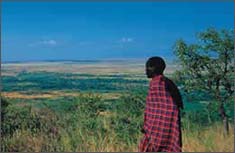|
 Tourism as a Catalyst to Community Based Conservation in Kenya (TACK) Tourism as a Catalyst to Community Based Conservation in Kenya (TACK)
In Kenya there are various success stories of various community based projects but most of them are not breaking even because they are ignored by the convectional tour operators because they are perceived to be less profitable.
Most of the marginalized communities have embraced conservation with their two hands and have initiated community projects from which they are expecting to accrue tangible benefits; this positive attitude will not last forever if the benefits don't trickle soon. To avert this change of attitude TACK promotes the of conservation enterprises, which in turn provide a viable economic motivation for communities to continue conserving.
Community Based Conservation (CBC) is the way forward in today's conservation worldwide. Significant proportion of Kenya's wildlife lives outside the protected areas and for conservation to be successful communities around protected areas will have to be involved in this process. This enables the communities to see wildlife as a resource that they can exploit and live harmoniously with them. For Kenyans therefore, living in close proximity to wild animals can be a painful and expensive exercise and at times tragic. There is need to attend to community-driven projects, which motivate the local to live harmoniously with the wildlife.
TACK lobbies for communities to embark on community based projects through which they can earn direct returns from accommodating wildlife. TACK seeks to address the issues outlined below;
Solving of human - wildlife conflicts
Communities living in the dispersal areas that support 90% of Kenya's wildlife have literally no say in conservation policy. The recent outrage by the Maasai community in Kitengela whose cattle have been killed by lions is a pointer to the urgent need to review the wildlife policy that seems to favor animals to human beings. Conservationists driven with good intentions and fundraisers raise millions of dollars in the name of protecting wildlife and have an incentive to keep things as they are. These groups have pursued preservation policies as opposed to conservation. Conservation is the sustainable use, manipulation and management by man of renewable natural resources for both cultural and economic purposes such as hunting, fishing, logging, and grazing of livestock and soil utilization for agriculture. While preservation on the other hand focuses on complete protection of resources with minimal management interventions allowing natural regulations to determine the evolution of the ecosystems such as national parks. TACK has established that human centered conservation, based on incentives to protect both animals and vegetation, is critical to the success of any conservation endeavor. This will happen only if the rural poor who live closest to the wild animals are involved and enfranchised in the process of conservation, through the extension of protection of property rights to land and wildlife. Giving communities the right to benefit from wildlife to the exclusion from others will be strategic. Let this communities own shares in the wildlife resource, this will give them an incentive to not only protect wildlife but also participate in its management. Ownership of this natural resource provides economic freedom and an incentive to make the communities develop more innovative ways to co-exist with wildlife.
Kenya is home to a number of endangered species (Black rhino, Cheetah, Grevy's Zebra, wild dog and Roth's Child Giraffe) and other vulnerable species such as Elephants and plain games that are vulnerable to commercial and subsistence poachers. To address this TACK lobbies for community involvement for conservation through carefully designed interventions such as employment of community scouts, equipping community conservation projects with HF radios and educating communities on the need to conserve.
|